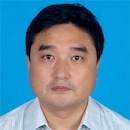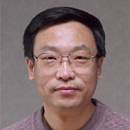Academic Editors
The following people constitute the Editorial Board of Academic Editors for PeerJ. These active academics are the Editors who seek peer reviewers, evaluate their responses, and make editorial decisions on each submission to the journal. Learn more about becoming an Editor.

Hong-Wei Sun
Chief, Biodata Mining and Discovery Section, OST, IRP, NIAMS, NIH
Twenty years of experience in Bioinformatics since post-doc at Yale, where I solved the x-ray crystal structure of a cytokine (MIF). Developed and implemented in recent years a significant number of NGS data analysis pipelines and methods with emphasis on ChIP-Seq, ATAC-Seq, RNA-Seq, scATAC-Seq, scRNA-Seq, Enhancers & Super Enhancers, and AI/ML. Co-authored more than 60 NGS data-based publications since 2010, including 33 in high impact journals such as Nature, Science, Cell, Nature Immunology, Science Immunology, Nature Cell Biology, Nature Structural Biology, Immunity, Molecular Cell, and PNAS. A founding member of four Bioinformatics groups. Co-author of two published Java programs. Also a co-author of a Medical Bioinformatics textbook and a co-inventor of nine issued patents.

Qing-Yuan Sun
Professor of Reproductive and Developmental Biology, vice-president of Chinese Society of Zoology, president of Chinese Society for Cellular and Molecular Microscopy, Secretary General of Chinese Society of Reproductive Biology, and former director of the State Key Laboratory of Reproductive Biology, Institute of Zoology, Chinese Academy of Sciences.
Awards and Honors:
- Distinguished Young Scientist of The Chinese Academy of Sciences (1999);
- Grants for Outstanding Young Scientists from National Natural Science Foundation of China (2002);
- National Award for Distinguished Scholars Returned From Abroad (2003);
- Distinguished Youth of The Chinese Academy of Sciences (2003);
- National Award for Outstanding Young Scientists (2004);
- National Award for Outstanding Post-Docs (2006);
- National Natural Science Prize (Second) (2006)
- BHP Billiton Supervisor Research Award, Graduate School of Chinese Academy of Sciences (2007)
- The Outstanding Researcher during the National 11th Five-Year Plan, Ministry of Science and Technology (2011)
- The First Prize for Science and Technology Progress, National Population and Family Planning Council (2011)

Dong Sun
Dr. Dong Sun is Associate professor at Second Institute of Oceanography, MNR, China. His current research interests include zooplankton ecology in the open ocean and marginal seas of the western Pacific. His focus is on the variation of zooplankton community structure and their energy transfer efficiency in planktonic ecosystems, along multiple environmental gradients, including vertical gradients, large-scale latitudinal gradients and micro- to meso-scale eutrophication gradients.

Xiaolin Sun
Senior scientist, Host-Microbe Interactions, The New Zealand Institute for Plant and Food Research.

Andrea Sundermann
Primary research interests: Effects of stream restoration on aquatic organisms, dispersal of aquatic insects, environmental factors controlling establishment of aquatic organisms in near natural, restored and degraded rivers, threshold values of physico-chemical variables controlling benthic invertebrate occurrences.

Aslı Suner
Dr. Aslı Suner Karakülah currently works at Ege University, School of Medicine, Department of Biostatistics and Medical Informatics in Turkey as an associate professor. She obtained BSc (2005), MSc (2007) and PhD (2013) degrees from Dokuz Eylül University, Science Faculty, Statistics Department in Turkey. Between March 2011 and February 2012, she joined Professor Klaus-Peter Adlassnig’s research group as a visiting PhD student at Medical University of Vienna, Center for Medical Statistics, Informatics, and Intelligent Systems, Section for Medical Expert and Knowledge-Based Systems, Vienna, Austria. Her main research interests include: biostatistics, bioinformatics, medical informatics and applied statistics – particularly the analysis of problems in decision theory, multicriteria decision making, clinical decision support systems, and data mining.

Armando Sunny
Dr. Armando Sunny is a Researcher and Professor within the Applied Biological Sciences Research Center, Science Faculty at the Autonomous University of the State of Mexico (UAEM).
He is interested to know how certain features of the landscape affect the genetic diversity and structure of species in anthropized environments, for this he performs analysis of landscape genetics, population genetics, niche modeling, SIG, landscape connectivity and global change analysis, especially in amphibians and reptiles.

Jason D Surratt
Dr. Jason Surratt is a Professor with tenure at the University of North Carolina-Chapel Hill in the Department of Environmental Sciences and Engineering located within the Gillings School of Global Public Health, as well as in the Department of Chemistry. He received his Ph.D. in chemistry from Caltech, and his B.A. and B.S. degrees in chemistry and meteorology, respectively, from North Carolina State University. His current research utilizes advanced mass spectrometry techniques with synthetic organic chemistry to understand as deeply as possible the atmospheric chemistry that occurs in both the gas and condensed phases, with special focus on the chemistry leading to the formation of secondary organic aerosol (SOA). His research has helped to derive model parameterizations that more explicitly predict atmospheric levels of isoprene-derived SOA, and has revealed the importance of acid-catalyzed multiphase chemistry in SOA formation.
He is the 2016 recipient of the James J. Morgan Environmental Science & Technology Early Career Award Lectureship, the 2013 recipient of the American Association for Aerosol Research (AAAR) Sheldon K. Friedlander Award, and the 2012 recipient of the Health Effects Institute (HEI) Walter A. Rosenblith New Investigator Award. Dr. Surratt has authored and co-authored more than 110 peer-reviewed articles in aerosol science, atmospheric chemistry, and air pollution journals.

Catherine M Suter
Cath Suter is currently an ARC Fellow and head of the Epigenetics Laboratory at the Victor Chang Cardiac Research Institute in Sydney. Suter was the first to describe germline epimutations in humans, and her major interest continues to be mammalian germline epigenetic phenomena and their inheritance. Her group focuses on the epigenetic contribution to phenotypic variation and disease risk, with a particular interest in the role of environment in modulating epigenetic inheritance.

Easter S Suviseshamuthu
Dr. Suviseshamuthu is an Associate Research Scientist at the Human Performance and Engineering Research Lab, Kessler Foundation, West Orange, NJ, U.S.A., since Dec. 2015.
He received the B.E. degree in Electronics and Communication Engineering from the Government College of Engineering, Tirunelveli, India (1988), the M.E. degree in Applied Electronics from Bharathiar University, Coimbatore, India (2001), and the Ph.D. in Multispectral Satellite Image Analysis from the Laboratoire des Sciences de l’Information et des Systèmes, Université de la Méditerranée, Marseille, France (2007). He was Post-Doctoral Fellow at the Bioimaging and Biostructure Institute, Italian National Research Council, Naples, Italy, (2008 to 2010), the Department of Mathematical Engineering, Université catholique de Louvain, Louvain-la-Neuve, Belgium, (2010 to 2014), and the GIPSA-Lab, Université Joseph Fourier, Grenoble, France (2014 to 2015).
His research focus encompasses statistical signal processing, blind source separation, medical imaging, optimization on matrix manifolds, machine learning, biomedical signal analysis, and bio-inspired computing. He serves as Associate Editor of IEEE Access.

Marcelino T Suzuki
I am from Brazil, where I obtained a degree in Oceanography from the Univ. do Rio Grande. I then finished a Masters and a PhD in Oceanography at Oregon State Univ under the co-supervision of Ev and Barry Sherr and Steve Giovannoni working on the effects of protist bacterivory on bacterioplankton community structure. Next I worked at the Monterey Bay Aquarium Research Inst. supervised by Ed DeLong on topics including the analysis of bacterioplankton (BP) diversity, the development of real-time PCR for genes and mRNAs, and BP metagenomics, and the biology of photoheterotrophs in the Ocean. I was hired as an Assistant Professor at the Chesapeake Biological Lab where I led research on the diversity, phylogeny and activity of BP, measurements of PB gene expression in situ biology and microbial processes leading to methylmercury production by bacteria.
Since May 2009, I am a Professor At the Observatoire Océanologique de Banyuls and the head of the Microbial Biodiversity and Biotechnology Unit and the Scientific advisor of the Bio2Mar platform of the OOB. I lead research on the biology of photoheterotrophs in the Ocean, and the ecology and genomics of, and the exploitation of, marine microorganisms for biotechnological purposes. My main interests are the connection betweem specific bacterioplankton activity and marine biogeochemical cycles, microbial biotechnology, the biology of photoheterotrophy, and chemical interactions of microbes in symbiosis.

Terje Svingen
Assoc. Prof. Svingen is Head of Research group for Molecular & Reproductive Toxicology at the National Food Institute, Technical University of Denmark (DTU Food). His research group focuses on how early life exposure to environmental chemicals, particularly endocrine disruptors, can adversely affect development and lead to disease. His research group conducts basic research alongside involvement in regulatory toxicology. Main focus is on the mechanisms of effects leading to reproductive and neurodevelopmental disorders.

